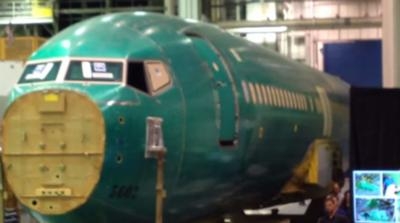For Want of Forward Momentum
Commercial aviation and aerospace titan Boeing announced that production and deliveries of its 737 MAX will be reduced in the near-term due to issues with parts supplied by longtime subcontractor Spirit AeroSystems.

The news belies an 06 April announcement in which the plane-maker made public its plans to up 737 MAX production from 31 to 38 specimens monthly.
The setback, which sent Boeing’s and Spirit AeroSystems’s stocks tumbling by five and 12-percent respectively, promises to adversely impact Boeing’s stated goal of delivering four-hundred 737 MAX jets in 2023.
The problem, the latest in a dreary and protracted succession of Boeing company setbacks, is attributable to faults with two fittings by which the 737 MAX’s aft fuselage and empennage are joined. Subject fittings are produced by Wichita-based Spirit AeroSystems—the world’s largest first-tier aerostructures manufacturer.
Boeing stated: "A supplier has notified us that a non-standard manufacturing process was used during the installation of two fittings in the aft fuselage section of certain 737-7, 737-8, 737-8-200 and P-8 model planes, creating the potential for a non-conformance to required specifications."
Boeing hastened to explain that the identified irregularity is not a safety of flight issue, and in-service Boeing aircraft may continue to operate without risk.
The issue could, however, affect a significant number of undelivered 737 MAX aircraft in both production and storage, thereby resulting in reduced 737 MAX deliveries. The exact number of jets impacted by the non-conformance to required specifications has yet to be determined.
Boeing has made the Federal Aviation Administration aware of the issue and is working to inspect and address affected 737 MAX fuselages. The company stated, also, that it is communicating with affected customers vis-à-vis revised aircraft delivery schedules.
Spirit AeroSystems Holdings Inc., the aerospace firm by which the aluminum fuselage frames of Boeing’s 737-MAX aircraft are manufactured, stated it had notified Boeing of the quality issue with certain 737 models. The company is currently working to develop inspection and repair protocols germane to the affected fuselages.
Spirit AeroSystems’s website reports the company currently produces upwards of seventy-percent of 737 fuselages.
Part 121 operators of Boeing’s 737 MAX expressed concerns regarding possible interruptions to aircraft deliveries. Southwest Airlines, the fleet of which comprises Boeing 737 family aircraft exclusively, expects the prevailing issue to impact deliveries of its new 737 MAX jets.
American Airlines reported in a statement that it is working with Boeing to determine the extent to which its own 737 MAX deliveries stand to be affected.
United Airlines, however, expects its summer 2023 capacity will not be impacted by the burgeoning debacle.

Over the last year, Boeing has worked to maintain a stable monthly output of 31 737-MAX jets from its plant adjacent Renton, Washington’s Renton Municipal Airport (RNT). The storied OEM—beleaguered by years of upheaval occasioned by the worldwide grounding of the 737-MAX fleet, regulatory entanglements, and supply-chain disruptions ascribed to COVID—has more recently contended with shortages of engines and cabin equipment while striving to shape greenhorn new-hires into journeymen aircraft builders.
In the first three months of 2023, Boeing delivered 130 commercial airliners compared to 127 delivered by hated European rival Airbus. Boeing's deliveries were especially strong in March, during which the company delivered 64 commercial aircraft, its second-highest delivery month in four years.
Of its three aircraft assembly facilities in Renton, Washington, Everett, Washington, and North Charleston, South Carolina, Boeing delivered 130 commercial airplanes in the first quarter, with the 737 MAX accounting for 111 aircraft or 85-percent of total deliveries.
 NTSB Final Report: Rutan Long-EZ
NTSB Final Report: Rutan Long-EZ ANN FAQ: Turn On Post Notifications
ANN FAQ: Turn On Post Notifications Classic Aero-TV: ICAS Perspectives - Advice for New Air Show Performers
Classic Aero-TV: ICAS Perspectives - Advice for New Air Show Performers ANN's Daily Aero-Linx (06.28.25)
ANN's Daily Aero-Linx (06.28.25) Aero-News: Quote of the Day (06.28.25)
Aero-News: Quote of the Day (06.28.25)




